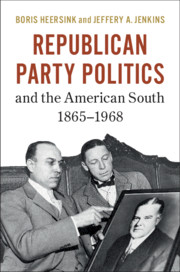Book contents
- Republican Party Politics and the American South, 1865–1968
- Republican Party Politics and the American South, 1865–1968
- Copyright page
- Contents
- Tables
- Figures
- Preface
- 1 Introduction
- 2 The Republican Party and the South: Some Preliminaries
- Part I The South and National Republican Party Politics, 1865–1968
- 3 The Rise and Fall of a Republican South, 1865–1877
- 4 The Attempt to Rebuild the Republican Party in the South, 1877–1896
- 5 The System of 1896 and Republicanism in the South, 1897–1932
- 6 Toward a Modern Southern Strategy, 1933–1968
- Photos
- Part II Southern Republican Party Politics at the State Level
- Index
4 - The Attempt to Rebuild the Republican Party in the South, 1877–1896
from Part I - The South and National Republican Party Politics, 1865–1968
Published online by Cambridge University Press: 06 March 2020
- Republican Party Politics and the American South, 1865–1968
- Republican Party Politics and the American South, 1865–1968
- Copyright page
- Contents
- Tables
- Figures
- Preface
- 1 Introduction
- 2 The Republican Party and the South: Some Preliminaries
- Part I The South and National Republican Party Politics, 1865–1968
- 3 The Rise and Fall of a Republican South, 1865–1877
- 4 The Attempt to Rebuild the Republican Party in the South, 1877–1896
- 5 The System of 1896 and Republicanism in the South, 1897–1932
- 6 Toward a Modern Southern Strategy, 1933–1968
- Photos
- Part II Southern Republican Party Politics at the State Level
- Index
Summary
During the latter half of the Reconstruction era, Republicans in the South faced major electoral defeats due to the enfranchisement of white voters, dismal economic conditions, and Democratic Party-sponsored terror against black voters. As a result, by 1877 the Democrats won unified control of state governments across the region – and largely held it for the succeeding two decades. Yet this decline in Republican electoral strength did not reduce the South’s influence at the GOP national convention. Indeed, from 1877 to 1896, the eleven states of the former Confederacy made up around 25 percent of Republican convention delegates. There were three reasons for this. First, many Republican national leaders remained hopeful that the end of Reconstruction was not the final word on the GOP’s role in the South and believed that a winning electoral strategy could be devised for the party to remain a viable political force in the South. Second, Southern delegates passionately – and, to a large extent, correctly – argued that their states’ inability to produce electoral votes and congressional seats for the GOP was due to Democratic sabotage of the electoral process. With Southern blacks increasingly excluded from the democratic process at home, the Republican National Convention remained one of the few remaining political arenas in which they could participate. For the party of Lincoln to try and strip these delegates of their role within the party was, for some, problematic. Finally, Southern delegates were very helpful to presidential hopefuls from other parts of the country because their support could be easily acquired through patronage and other forms of bribery. Thus, whoever could afford to court the South could go into the convention with a sizable bloc of votes.
- Type
- Chapter
- Information
- Republican Party Politics and the American South, 1865–1968 , pp. 101 - 132Publisher: Cambridge University PressPrint publication year: 2020

